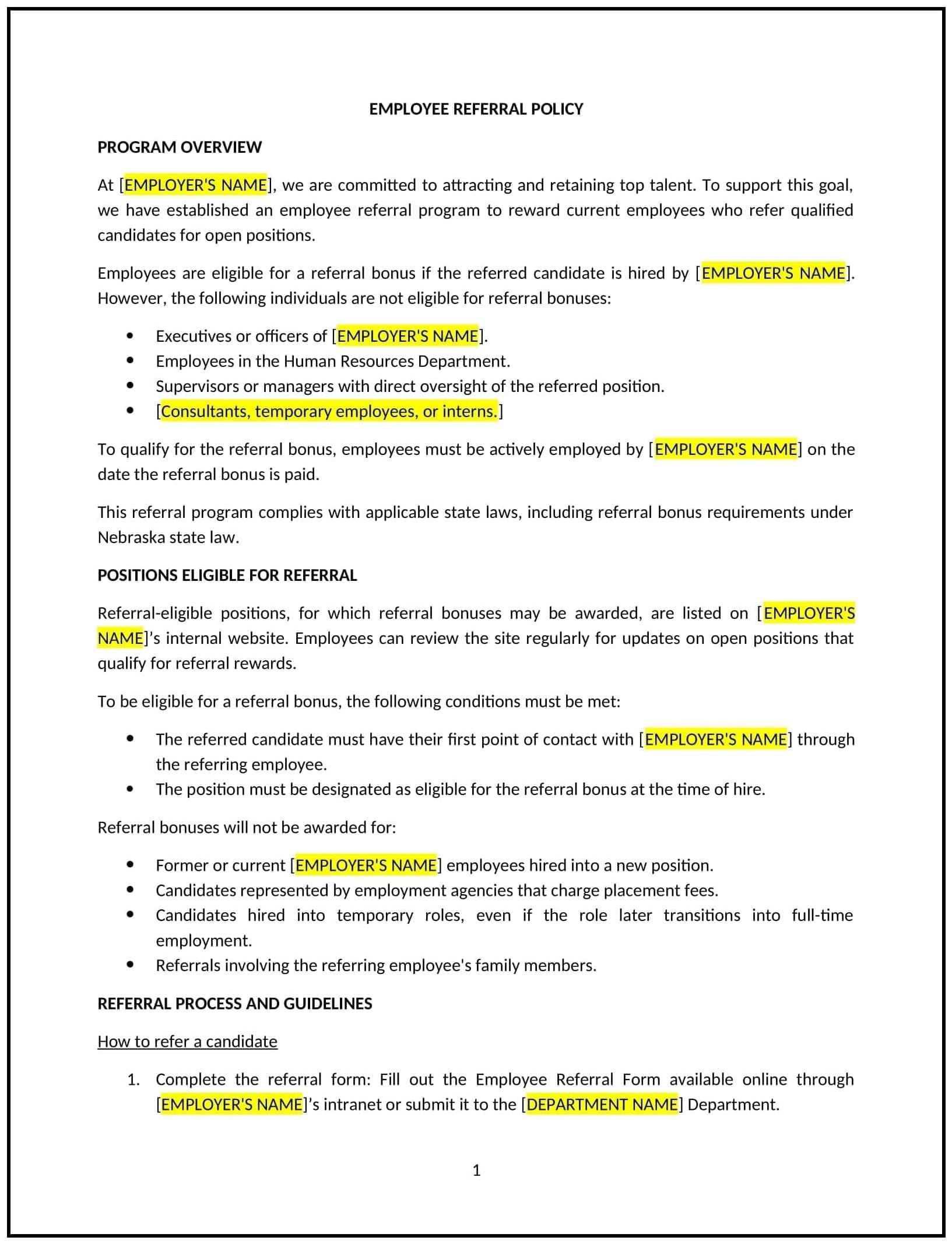Got contracts to review? While you're here for policies, let Cobrief make contract review effortless—start your free review now.

Customize this template for free
Employee referral policy (Nebraska)
An employee referral policy helps Nebraska businesses leverage their workforce to find qualified candidates by encouraging employees to refer individuals for open positions. This policy outlines the process for making referrals, the incentives offered for successful referrals, and the expectations for employees participating in the referral program. It is designed to promote a positive, engaging hiring process by utilizing the existing network of employees to attract talent that is a good fit for the organization.
By adopting this policy, businesses in Nebraska can enhance their recruitment efforts, reduce hiring costs, and foster a more engaged workforce by involving employees in the hiring process.
How to use this employee referral policy (Nebraska)
- Define referral eligibility: Clearly specify who is eligible to make referrals, such as all employees or certain categories of employees (e.g., full-time, part-time, or temporary staff). Ensure employees know who can be referred (e.g., for full-time positions, internships, etc.).
- Set the referral process: Outline the steps employees should follow to refer someone for a position, such as submitting a referral form, providing the candidate’s contact information, or sharing a resume. The process should be easy and efficient to encourage participation.
- Specify incentives: Define the incentives or rewards offered for successful referrals, such as a monetary bonus, gift cards, extra time off, or recognition. Be clear about the criteria for a successful referral (e.g., the referred candidate must stay employed for a certain period).
- Clarify eligibility for rewards: Outline any conditions for earning referral rewards, such as the referred candidate must be hired, pass the probationary period, or meet other qualifications.
- Address confidentiality and fairness: Ensure that employees understand the importance of confidentiality during the referral process, especially for current or former employees. The policy should also emphasize fairness and equal opportunity in the hiring process, where all referrals will be considered on the same basis.
- Set rules for referral limits: If applicable, specify whether there are any limits on the number of referrals an employee can make for a given position or over a certain period.
- Encourage diversity and inclusion: Encourage employees to refer candidates from diverse backgrounds and underrepresented groups to promote diversity and inclusion in the workplace.
- Review and update: Periodically review and update the policy to ensure it aligns with Nebraska labor laws, business needs, and any changes in recruitment strategies.
Benefits of using this employee referral policy (Nebraska)
This policy provides several benefits for Nebraska businesses:
- Reduces hiring costs: Employee referrals can lower recruitment costs by reducing reliance on external recruiters and job boards, which can be expensive.
- Improves quality of hires: Employees are likely to refer candidates who they believe are a good fit for the company, leading to better-quality hires who are more likely to succeed and stay with the company.
- Enhances employee engagement: Involving employees in the recruitment process can increase engagement by making them feel more invested in the success of the business and its workforce.
- Shortens hiring timelines: Employee referrals often lead to faster hiring decisions, as referred candidates may be more familiar with the company culture and expectations.
- Strengthens company culture: Referring individuals who are aligned with the company’s values and work culture helps maintain a cohesive and collaborative work environment.
Tips for using this employee referral policy (Nebraska)
- Communicate the policy clearly: Make sure all employees are aware of the employee referral program, its benefits, and how to participate. Use email, employee handbooks, and onboarding materials to inform employees.
- Provide ongoing incentives: Consider offering tiered or recurring incentives for multiple successful referrals or longer-term hires to keep employees motivated and engaged in the program.
- Track referrals and outcomes: Maintain a tracking system to monitor referred candidates and ensure that employees receive their rewards for successful hires. This helps ensure transparency and accountability.
- Celebrate successes: Recognize employees who provide successful referrals through company-wide announcements or rewards, making the process more rewarding and motivating for others.
- Review the program regularly: Evaluate the effectiveness of the referral program regularly to assess how well it is meeting recruitment goals and if adjustments to the incentives or process are needed.